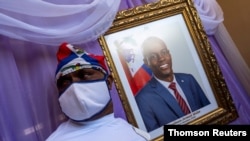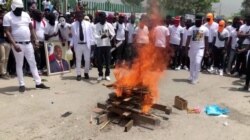Garry Orelien, the judge named to oversee the investigation into the slaying of Haitian President Jovenel Moise, is being criticized as inexperienced and incapable of handling the case.
Orelien replaces Judge Mathieu Chanlatte, who resigned August 13, citing personal reasons. One of Chanlatte's assistants died under unclear circumstances the day before his resignation, The Associated Press reported.
Moise was shot to death inside his home in a luxury suburb of the capital, Port-au-Prince, in the early morning hours of July 7. His wife, Martine Moise, was injured and later transferred to Florida for treatment.
The Haitian National Police (PNH) has arrested dozens of people in connection with the case, including Haitian Americans, Colombians, members of the president's security detail and police officers.
Orelien previously worked as a substitute judge in Saint Marc and Croix-des-Bouquets, Le Nouvelliste newspaper reported. He was moved to the Port-au-Prince court in December 2020.
Rockfeller Vincent, Haiti’s minister of justice and public security, tweeted Monday that he was making available all necessary resources to Judge Orelien to move forward with the case. “Let me be clear: All efforts will be made to arrest all individuals implicated in this crime,” he tweeted.
Pierre Esperance, executive director of the National Network for the Defense of Human Rights (RNDDH), told VOA Tuesday he thinks Orelien is a bad choice.
"This is not a judge who has any experience in handling this type of case," Esperance said. "The entire world is watching this case, and we need a judge who has the personality, character and will to follow the rule of law."
Pastor Edouard Paultre, leader of the Haitian Council of Non-State Actors, told VOA he doesn't believe the judge can handle the case.
"I don't think one judge alone can get results. We need collaboration at the judicial level," he said.
Former Senator Jean Renel Senatus, who has a law degree, would prefer that a "college of judges" oversee the Moise case.
"And in order to do that," he told VOA, "the general assembly of judges should adopt a resolution that says, 'Due to the scope and complexity of the case, we will name a college of three judges to oversee the case.'"
The naming of the new judge comes on the heels of a report issued Monday by the RNDDH on the investigation into the Moise slaying.
In an exclusive interview with VOA Creole Monday, Marie Rosy Auguste Ducéna, a lawyer and human rights activist, alleged that the national police are deeply implicated in the killing.
She mentioned Joseph Felix Badio, a former Haitian Justice Ministry official who has a warrant out for his arrest, as having made at least two phone calls to Prime Minister Ariel Henry. Ducéna told VOA that Badio made the phone calls on the morning that Moise was killed.
"I'd like to underline that there are 647 police officers whose principal mission is to protect the president. We can say they failed, since the president was assassinated," Ducéna told VOA. "Secondly, there were 63 agents detailed to provide security for the president, and they had backup agents whose responsibility it was to secure the perimeter of the president's residence. However, they allowed the commandos to gain access to the home. Why? Because they had been paid off."
The RNDDH report also alleges that PNH Director General Leon Charles received two urgent phone calls from Moise the day of his assassination, but the report says Charles never responded.
VOA Creole's calls to Henry and Charles requesting comment were not answered.
In Washington, Ricardo Zuniga, U.S. special envoy for the Northern Triangle at the State Department's Bureau for Western Hemisphere Affairs, told VOA that the United States is still assisting Haiti with the Moise investigation.
"What we have is a promise from the United States to contribute to and collaborate with the Haitian officials leading the investigation," Zuniga, speaking Spanish, told VOA Monday. "What is important going forward is that this be a Haitian-led effort. So, the United States, along with our international partners, will continue to do whatever we can to help the Haitian officials move forward with the case."
Asked by VOA if U.S. President Joe Biden plans to invite Henry to the White House for talks, Zuniga instead addressed the recent earthquake in Haiti, which killed more than 2,200 people.
"Right now, the focus of the new prime minister and the Biden administration is dealing with the current crisis," Zuniga said of the post-earthquake recovery effort. "So, it's clear that we need to collaborate in order to relieve the suffering of the Haitian people. That is our focus."
Meanwhile, in Port-au-Prince, ordinary citizens are expressing doubt about whether Moise's killer will ever be brought to justice.
Contributed to this report Cristina Caicedo Smit, Jacquelin Belizaire.
Some information for this report came from The Associated Press.





